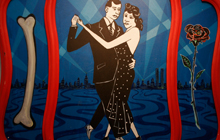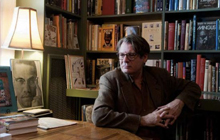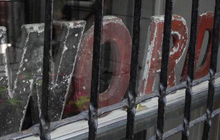Maxims by the Pound
From ABC of Reading. Ezra Pound.
Literature is language charged with meaning. Literature is news that STAYS news.
If a nation’s literature declines, the nation atrophies and decays. Your legislator can’t legislate for the public good, you commander can’t command, you populace (if you be a democratic country) can’t instruct its ‘representatives’, save by language.
The fogged language of the swindling classes serves only a temporary purpose.
Rome rose with the idiom of Caesar, Ovid, and Tacitus, she declined in a welter of rhetoric, the diplomat’s language to conceal thought, and so forth.
The man of understanding can no more sit quiet and resigned while his country lets its literature decay, and lets good writing meet with contempt, than a good doctor could sit quiet and contented while some ignorant child was infecting itself with tuberculosis under the impression that it was merely eating jam tarts.
It is very difficult to make people understand the impersonal indignation that a decay of writing can cause men who understand what it implies, and the end whereto it leads. It is almost impossible to express any degree of such indignation without being called ‘embittered’, or something of that sort.
THE READER’S AMBITION may be mediocre, and the ambitions of no two readers will be identical.
‘Great literature is simply language charged with meaning to the utmost possible degree.’
An epic is a poem including history.
Phanopoeia : ‘the throwing of an image on the mind’s retina.’
Music rots when it gets too far from dance. Poetry atrophies when it gets too far from music.
One reads prose for the subject matter.
*
Incompetence will show in the use of too many words.
The reader’s first and simplest test of an author will be to look for words that do not function; that contribute nothing to the meaning OR that distract from the MOST important factor of the meaning to factors of minor importance.
One definition of beauty is : aptness to purpose.
Whether it is a good definition or not, you can readily see that a good deal of BAD criticism has been written by men who assume that an author is trying to do what he is NOT trying to do.
*
An attempt to set down things as they are, to find the word that corresponds with the thing, the statement that portrays. and presents, instead of making a comment, however brilliant, or an epigram.
Flaubert is the archetype. The Brothers Goncourt codified and theorized and preached Flaubert’s practice. Flaubert never stopped experimenting. Before he had finished he called his Salammbo ‘cette vieille toquade’, or old charade in fancy clothes.
*
THE FIRST PHASE of anyone’s writing always shows them doing something ‘like’ something they have heard or read.
The majority of writers never pass that stage.
*
‘the value of old work is constantly affected by the value of the new.’
…The cinema supersedes a great deal of second-rate narrative, and a great deal of theatre.
A film may make better use of 60 per cent of all narrative dramatic material. Each case can be decided on its own merits.
In all cases one test will be, ‘could this material have been made more efficient in some other medium?’
*
‘L’historie morale contemporaine’, the history of contemporary moral disposition , the history of the estimation of values in contemporary behavior.
*
The concept of genius as akin to madness has been carefully fostered by the inferiority complex of the public.
…Before deciding whether a man is a fool or a good artist, it would be well to ask, not only: ‘is he excited unduly’, but: ‘does he see something we don’t?’
Is his curious behavior due to his feeling of oncoming earthquake, or smelling a forest fire which we do not yet feel or smell?
*
The authors and books I recommend in this introduction to the study of letters are to be considered AS measuring-rods and voltmeters.
The books listed are books to have in mind, BEFORE you try to measure and evaluate other books. The are, most emphatically, NOT all the books worth reading.
A great deal of what you read, you simply need not ‘bother about’.
On the other hand, you needn’t fall into the silly snobbism that has ruined whole shoals of fancy writers, polite essayists, refined young gents, members of literary cenacles und so weiter.
*
The honest critic must be content to find a VERY LITTLE contemporary work worth serious attention; but he must also be ready to RECOGNIZE that little, and to demote work of the past when a new work surpasses it.
The concept of genius as akin to madness has been carefully fostered by the inferiority complex of the public.
Artists and poets undoubtedly get excited and ‘over-excited’ about things long before the general public.
Before deiding whether a man is a fool or a good artist, it would be well to ask, not only: ‘is he excited unduly’, but: ‘does he see something we don’t?’
Is his curious behaviour due to his feeling an oncoming earthquake, or smelling a forest which we do not yet feel or smell?
From: How to Read
Introduction
People regard literature as something vastly more flabby and floating and complicated and indefinite than, let us say, mathematics. Its subject-matter, the human consciousness, is more complicated than are number and space.
II
The practice of literary composition in private has been permitted since “age immemorial,” like knitting, crocheting, etc. It occupies the practitioner, and, so long as he keeps it to himself, ne nuit pas aux autres, it does not transgress the definition of liberty which we find in the declaration of the Droits le l’Homme: Liberty is the right to do anything which harms not others. All of which is rather negative and unsatisfactory.
III
It appears to me quite tenable that the function of literature as a generated prize-worthy force is precisely that it does incite humanity to continue living; that it eases the mind of strain, and feeds it, I mean definitely as nutrition of impulse.
This idea may worry lovers of order. Just as good literature does often worry them. They regard it as dangerous, chaotic, subversive. They try every idiotic and degrading wheeze to tame it down. They try to make a bog, a marasmus, a great putridity in place of a sane and active ebullience. And they do this from sheer simian and pig-like stupidity, and from their failure to understand the function of letters.
IV
Misquoting Confucius, one might say: It does not matter whether the author desire the good of the race or acts merely from personal vanity. The thing is mechanical in action. In proportion as his work is exact, i.e., true to human consciousness and to the nature of man, as it is exact in formulation of desire, so is it durable and so is it “useful”; I mean it maintains the precision and clarity of thought, not merely for the benefit of a few dilettantes and “lovers of literature,” but maintains the health of thought outside literary circles and in non-literary existence, in general individual and communal life. Or “dans ce genre on n’etmeut que par la clarte.” One “moves” the reader only by clarity. In depicting the motions of the “human heart” the durability of the writing depends on the exactitude. It is the thing that is true and stays true that keeps fresh for the new reader.
Part 2.
In introducing a person to literature one would do well to have him examine works where language is efficiently used; to devise a system for getting directly and expeditiously at such works, despite the smokescreens erected by half-knowing and half-thinking critics. To get at them, despite the mass of dead matter that these people have heaped up and conserved round about them in the proportion: one barrel of sawdust to each half-bunch of grapes.
Great literature is simply language charged with meaning to the utmost possible degree.
… in the wake of the valid.
You may say that for twenty-seven years I have thought consciously about this particular matter, and read or read at a great many books, and that with the subject never really out of my mind, I don’t yet know half there is to know about melopoeia. There are, on the other hand, a few books that I still keep on my desk, and a great number that I shall never open again. But the books that a man needs to know in order to “get his bearings,” in order to have a sound judgment of any bit of writing that may come before him, are very few.
(It is a modern folly to suppose that vulgarity and cheapness have the merit
of novelty; they have always existed, and are of no interest in themselves.)
a “classic” movement, a movement that restrained without inventing. Anything that happens to mind in England has usually happened somewhere else first.
Even the method of annihilating imbecility employed by Voltaire, Bayle, and Lorenzo Valla can be managed quite as well in rhymed couplets.
The art of popular success lies simply in never putting more on any one page than the most ordinary reader can lick off it in his normally rapid, half-attentive skim-over.
Henry James was the first person to add anything to the art of the nineteenth-century novel not already known to the French.
All the developments in English verse since 1910 are due almost wholly to Americans. In fact, there iS no longer any reason to call it English verse, and there is no present reason to think of England at all.
The French who know no English are as fragmentary as the Americans who know no French. One simply leaves half of one’s thought untouched in their
company.
*
From The Letters of Ezra Pound
“If I had only read Confucius earlier I would not be in this mess.” Ezra Pound to Charles Olson, Howard Hall (for the Criminally Insane), St. Elizabeth’s, 1945
‘Race prejudice is red herring. The tool of the man defeated intellectually and of the cheap politician.’ But the very characteristic next sentence is: ‘No one will deny that the jews have racial characteristics, better and worse ones.’
GOr-DDDAMMM mit!!! Get nimble.
‘As Mr Cohen said: “Vot I say iss, we got to svallow ‘em, vot I say iss, we got to svallow ‘e.” Or be boa-constricted.’
… there has been a perceptible decay in the imagination
The means of communication breaks down, and that of course is what we are suffering now. We are enduring the drive to work on the subconscious without appealing to the reason. They repeat a trade name with the music a few times, and then repeat the music without it so that the music will give you the name. I think of the assault. We suffer from the use of language to conceal thought and to withhold all vital and direct answers. There is the definite use of propaganda, forensic language, merely to conceal and mislead.
… There is natural ignorance and there is artificial ignorance. I should say at the present moment the artificial ignorance is about eighty-five per cent.
Another struggle has been the struggle to keep the value of a local and particular character, of a particular culture in this awful maelstrom, this awful avalanche toward uniformity. The whole fight is for the conservation of the individual soul. The enemy is the suppression of history; against us is the bewildering propaganda and brainwash, luxury and violence.
It is difficult to write a paradiso when all the superficial indications are that you ought to write an apocalypse.
Against the propaganda of terror and the propaganda of luxury, have you a nice simple answer?
‘Quite apart from military operations, from the results of military operations, from the possible results of any military operations that may occur, the American people appear to have suffered crashing defeat, at the hands of the financiers.’
*
From Impact: Essays on Ignorance and the Decline of American Civilization
“he tested accepted values and attempted to preserve the best …
‘He kept his curiosity alive, and sought to keep curiosity alive in others, in order to prevent people from becoming bogged down in cliché and superstition.
He sought to maintain a constant flow of significant factual data, in order to prevent “brainwashing.”
*
‘Our revolutionary culture was critical and not monolingual.
‘the obstruction is a composit of sloth, feart and greed.
‘The befouling of terminology should be put an end to. It is a time for clear definition of terms. Immediately of economic terms, but ultimately of all terms. It is not a revolution of the word but a castigation of the word.
‘The total democracy bilge, by which I mean the clichés, the assumptions, the current cant about “the people” arose from sheer misunderstanding or perversion. Perversion of ideas by means and misuse of words.
*
The “economic “ history of the United States is, on one side, the history of enormous waste of natural resources, wast that took place because no immediate need for thrift was apparent and, in many cases, did not exist.
“Free” craftsmanship in competition with the slave system.
Usury however is a cancer, finance a disease.
Polite society did not consider usury as Dante did, that is damned to the same circle of Hell as the sodomites, both acting against the potential abundance of nature.
*
it is idiotic to leave the pocket-book of the nation in the hads of private irresponsible individuals,. Perhaps foreign;
it is idiotic to leave the nation’s sources of information in the hands of private irresponsible individuals, sometimes foreign.
This ruin has its roots in greed for lucre, a greed which separates itself from all commonsense and every sense of proportion, and blindly creates its own undoing.
Man has been reduced not even to a digestive tube, but to a money-recepticle that gradually is losing its own value. This cycle has lasted three centuries; from the arribval of the “Pilgrims” who sought freedom of worship, to the cult of lucre dominating today. This is an economic history. It is the history of a spiritual decadence. Part of this story is technical, monetary, financial.
The aim of finance is to gain by the labor of others. In the last four decades, the aim of finance, in order that the gains of a small group be greater, has been the retention of all the profits of mechanical inventions and the lowering to a minimum of the workers’ rewards. And this was done in the open market through free enterprise.
The American tragedy is a continuous history of waste, waste of natural abundance first, then waste of the new abundance offered by the machine, and then by machines no longer isolated but correlated and centuplicating the creative power of human labour. (centuplicating: 100 X, increased by 100 fold.)
*
‘As to POETRY// it just ain’t till it is lived / Best of it has to be knocked out of man; at the end of his tether / no matter what tether // The real thing is the LAST resource/’
Post-litteracure twee-try
*
“I believe that banking institutions are more dangerous to our liberties than standing armies… If the American people ever allow private banks to control the issue of their currency, first by inflation, then by deflation, the banks and corporations will grow up around [the banks] will deprive the people of all property until their children wake up homeless on the continent their fathers conquered… The issuing power should be taken from the banks and restored to the people, to whom it properly belongs.”
Thomas Jefferson – The Debate over the Recharter of the Bank Bill (1809).

 Jumel Terrace B&B
Jumel Terrace B&B Life Turns Man Up & Down
Life Turns Man Up & Down The Private Library
The Private Library